While the fishing community in India was still grappling with the previous year's losses, COVID-19 emerged, denting their incomes further. Even after the lockdown ends, the fisheries will take much longer to recover.
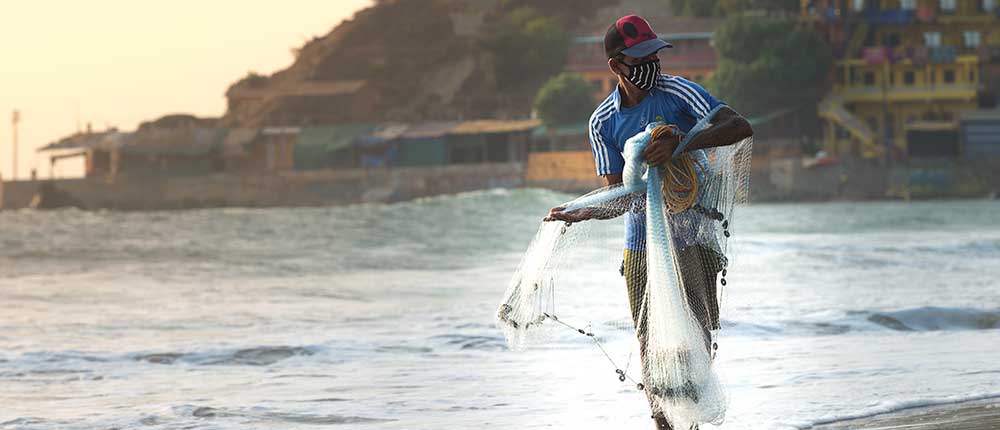
Last year, India's fishing community faced the brunt of cyclones. Most of the cyclones after 1974 happened in 2019. The community was still reeling under the losses from the previous year when COVID-19 hit hard. With the enforcement of social distancing, officials of fisheries departments began mulling how such restrictions could be put in place for the fishing harbour, landing centres, and auction houses. Though fisheries have been exempted from the lockdown rules, there are other looming concerns. With the export sector looking fuzzy, and the warehouses packed, where and how will the fisherfolk sell their catch? In this article, Sharada Balasubramanian shares valuable insights.
India faced almost nine cyclonic storms in 2019, the highest on record since 1974. While the fishing community was still grappling with the previous year's losses, COVID-19 emerged, denting their incomes further. The number of fishing days was reduced drastically due to both climate change risks and the COVID-19 scare.
India's vast coastline of 7500 km is a source of livelihood for almost 16 million people—the beneficiaries not just include the fisherfolk but also the populace of ice breakers, fish vendors, vehicle owners carrying fish, and boat owners among others. Pradip Chatterjee, President, National Platform for Small Scale Fish Workers (NPSSFW), says, 'In West Bengal alone if you take all categories of fish workers, fishers, fish farmers, fish vendors, there are about 3 million people. Marine fishers are smaller (communities) in West Bengal as the coastline is very short. There are 0.2–0.3 million (fishers) in the marine fisheries.'
"Due to cyclones, last year, the number of months the fisherfolk spent on the sea had reduced considerably. With five months of time lost due to cyclones, and now because of the lockdown, their woes have only multiplied."
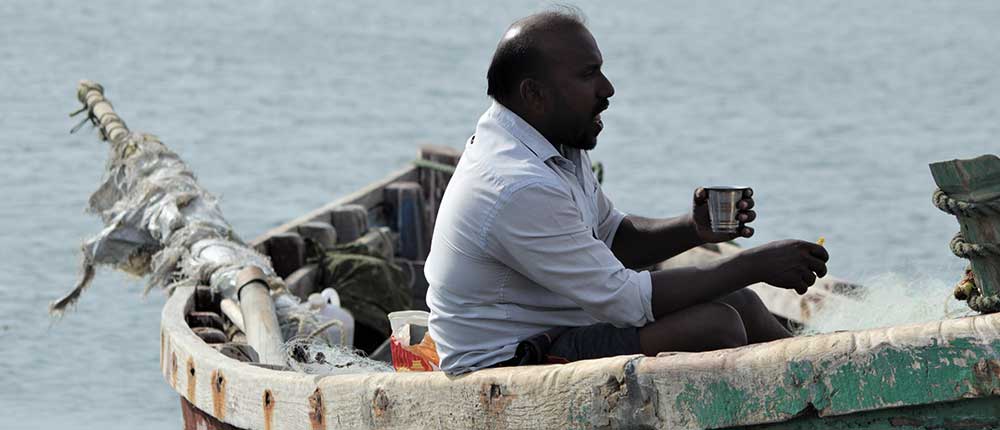
Impact of Climate Change
There is no doubt that climate change has been affecting the marine and inland fisheries. Additionally, environmental challenges such as ocean acidification, coral bleaching, and altered river flows also impact the fisherfolk.
According to the paper titled, 'The Impact of Climate Change on Marine and Inland Fisheries and Aquaculture in India', it was estimated that ecosystem services of the east coast of India will reduce by 25 per cent in 25 years, resulting in a cumulative loss of $17 billion. Moreover, there is a need for an immediate action plan to ensure sustainability in both marine and inland fisheries. Our climate is affected by tropical monsoons. Strong northeast winds blow from October until February, and southwest winds prevail from May until October. When the monsoon winds change, cyclones strike the coasts, especially the Bay of Bengal.
Changes in the important oceanic weather systems such as sea surface temperature, salinity, precipitation, sea level, frequency, and intensity of cyclones and droughts are now more evident due to climate change. And these have adverse implications for the fishing community. The 2019 North Indian Ocean cyclones season proved most severe. In January 2019, India faced Cyclone Pabuk followed by Cyclone Fani, Vayu, Hikaa, Kyarr, Maha, Bulbul, and Pawan all through the year, putting the livelihoods of many fish workers at stake across the country.
In Veraval, Gujarat, fish workers have been asking the state fisheries department for compensation since August as they could not fish due to cyclones last year. As these cyclones occurred more on the sea than on land, the fish workers would often have to return from the sea midway, empty-handed. Tulsi Bhai Gohel, President of a boat owners association in Veraval, recounts, 'We spent almost 300,000 to hire a boat, people, spend for fuel, all of that added to the losses.'
Also, with a rise in fishing, there is more pressure on marine resources too. Consequently, there are more livelihood challenges for fish workers as they find only a handful or no fish in the sea due to increased overfishing. Polluted seas, rivers, destructive fishing methods, commercial boats and nets have detrimental effects on our environment. Additionally, there is more livelihood pressure on poor fisherfolk. Chatterjee avers, 'With the polluted rivers in West Bengal, Hilsa fish does not even prefer to enter the river.'
S Velvizhi, a scientist from MS Swaminathan Research Foundation (MSSRF) says, 'Fishermen are not able to catch fish they caught earlier. For example, oil sardine, which was earlier found in Malabar Coast is now found in Tamil Nadu. According to reports, 60 per cent of the Indian Ocean has oil sardines. The larger question is: How did they come there? Scientists say, due to a rise in temperature, the population of sardines grows. Similarly, in squid fishery, we were not getting many squids earlier, but now, their population has increased.' She adds, 'If we look at mackerel fish, they are surface fish. Fishermen carry surface gill nets to capture those fish. Now, due to temperature variation, these fish have gone from surface water to mid-water. If fishermen fish using surface gill nets, they cannot catch these fish. They will come back and say, there was no catch. Therefore, the fishermen have been pushed to adapt and change their fishing technique.' Such a change of technique in catching fish is a point of major concern.
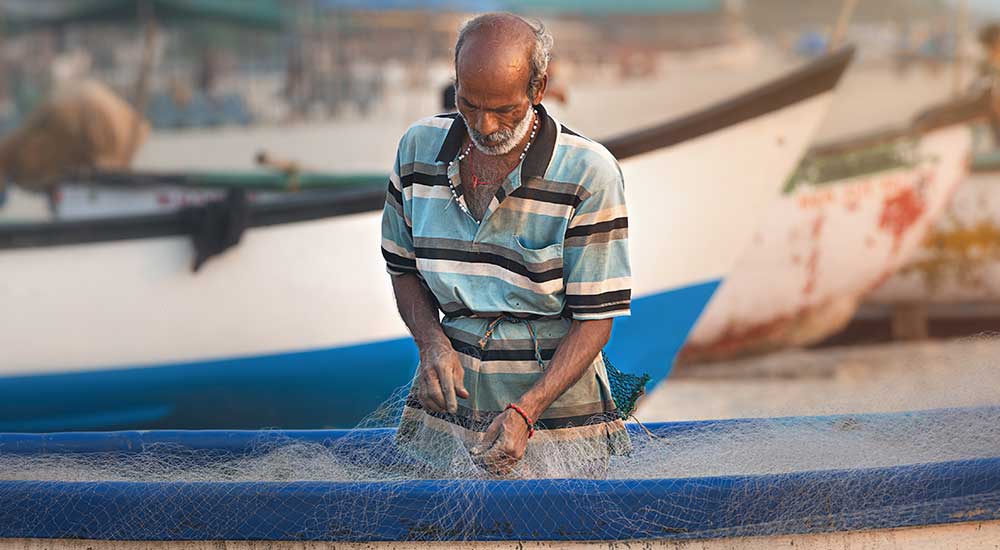
Increased industrial fishing has also reduced the stock of marine resources. Consequently, small-scale fish workers have to bear the brunt. They do not have the required resources such as trawlers for deep-sea fishing. And when these large trawlers go into the sea, the small-scale fish workers are left with an inadequate catch. 'Fishermen can predict the wind pattern and decide which net to carry for fishing, accordingly. Now, they are unable to predict the changing wind conditions. All this is affecting their livelihood. Fishermen, as a whole (community), get affected, but the most affected are the poor fishermen,' points out Velvizhi.
MSSRF trained the fish workers and sensitized them on various aspects to keep the sea and shore clean, practise habits that prevent them from using plastic and refrain from exploiting the marine resources. For instance, MSSRF offers training on how the fish workers should not carry small plastic packets to the sea. Instead, they should carry large 20-litre cans. And they should not throw any trash into the sea. This kind of sensitization and awareness can go a long way in protecting our marine wealth along with the species dependent on the seas and oceans for their survival.
Lockdown Woes
Now, with the lockdown, the fishing days have been further reduced. Gohel says, 'When the boat goes, there are so many people whose livelihood depends on that. Eight to ten families depend on this after the boat returns from fishing. People work with fish suppliers. There are commercial vehicles, rickshaws on which all those families are also dependent. The fish catch goes to the company and the processing plant where hundreds of people work to process and dry fish.'
In Tamil Nadu, after the lockdown, fish workers said that when they returned with a large catch, they found themselves on a deserted harbour with policemen cordoning off the area. They had no knowledge about the lockdown and its rules. They had to look for alternative ways to sell the fish they had brought with them. Some export houses bought and stocked them in their warehouses, but later, these warehouses would get full, and the fish workers would be told off. Also, the fish were procured at a price that was not profitable to the fish workers. Alas, was there really a choice for them?
In Tharavaikulam, in the Tuticorin district of Tamil Nadu, long queues of vehicles helped in transporting the produce to Kerala—the largest consumer of the fish catch. In the initial phase of the lockdown in April 2020, inter-state transportation was shut, and as a result, the fish workers were stranded. The deep-sea fisherfolk, who had returned with their catch was in dire need of a viable solution.
After being pressurized by the National Fishworkers' Forum (NFF), NPSSFW, and other such fisheries groups, the government lifted the restrictions on the interstate transport of fish produce. The move came as a respite for the distressed fish workers. However, there were some apprehensions too. Bhaskar, a trader and exporter from Tharavaikulam recounts, 'They let the vehicles in but the Tamil Nadu police restricted us, as they feared we might get the disease from there.' Then, they exercised caution. Bhaskar adds, 'In Kerala, they sprayed disinfectant on the vehicles before letting us in and out. They also advised the drivers to wear masks and wash their hands regularly.'
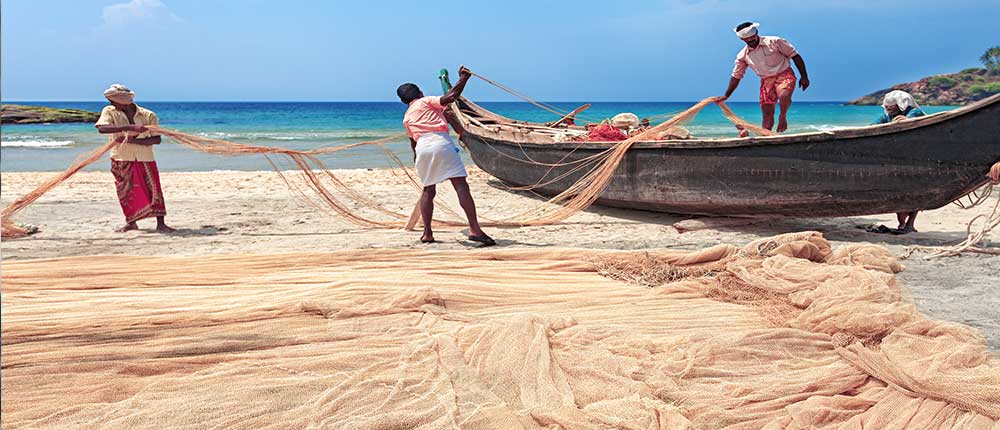
The government officials and the police are regulating the people. Bhaskar says, 'They make people follow social distancing in fish stalls like they do in vegetable shops and other meat shops. Officials have allotted a particular time for fish stalls. Within that time limit, these fish stalls must sell their stock, and after that, no one is allowed to open their shops.'
Immediately after the lockdown was announced in West Bengal, the NPSSFW group immediately developed an advisory on what kind of precautions should be taken in fish landing centres, the fishing harbour, auction centres, wholesale markets or regional markets, and also during the transportation of fish. Chatterjee explains, 'We developed that because we thought it was our duty to protect our community. And then we approached the government. The government came up with an advisory later. We have been telling them to relax the fisheries and allow us to function with precaution. That should be the approach. First, the government did not agree to that. And then, after a long time, on April 15 when the consolidated guidelines came out, they accepted our suggestion.' Meanwhile, the export market suffered.
Impact on Export
Data from the Directorate General of Foreign Trade (DGFT), the Ministry of Commerce and Industry, reveal that India exported nearly $6.3 billion (roughly 45,000 crores) worth of marine products in the financial year 2019. Andhra Pradesh is the top marine exporting state in the country with a compound annual growth rate (CAGR) of 15 per cent, followed by Gujarat and West Bengal with 10 per cent. In terms of export markets, the US is the largest market for Indian shrimp, while China and Vietnam are the largest importers of Indian frozen fish and molluscs, respectively. Together, these three countries make up about 50–60 per cent of India's marine export market.
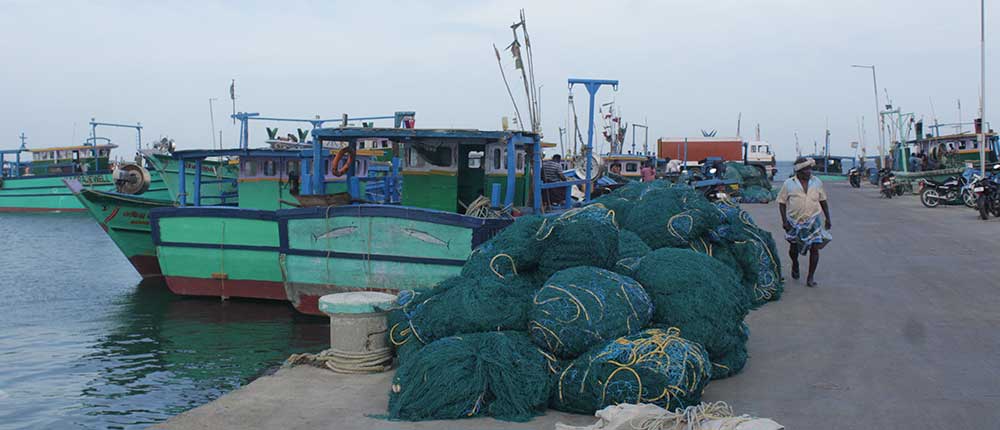
India's fisheries export market was shut post the lockdown. And those who fished every day to cater to the frozen fish segment, specifically meant for the export market, were left in the lurch.
Now, when the Indian government has exempted the fisheries sector from the lockdown, doubts still lurk. Exports are not open yet. So, even if the fishers go for deep-sea fishing, what will they do with the catch if the exporters buy it at a low price? And, what if the fish cannot be exported? That would be a huge loss for the fishers. Bhaskar said, the bank officials from their head offices have instructed to not export the stock to coronavirus-affected countries such as China, Italy, Spain, and so on. He says, 'Banks told us that those countries are in the red alert (zones), so, don't do any shipping. Everything got completely shut down here.'
And this is not the end, for Bhaskar explains, 'Even if we load the stock that is already in the factory, we have to get the lab report. For that, the authorities will get a sample from here and take that sample to either Chennai or Bengaluru for lab testing purposes. Inspection must be done.' Inspectors come from Cochin and there are agents from foreign countries who come to check the stock. Bhaskar says, 'They have to approve the stock for the shipment. We can't take the order. We can't do the inspection. We can't get the samples tested. So, none of those things is working.'
Vinoth Ravindran, Tamil Nadu Coordinator, Network for Fish Quality Management and Sustainable Fishing (NETFISH)—an arm of the Marine Products Exports Development Authority (MPEDA), says, 'We are taking the stock little by little without much crowd in the harbour. We were also told that social distancing norms must be followed.'
'With the ports and export markets being shut, there are no containers available for the exporters. If ports are closed, there aren't any containers available for export,' says an MPEDA official from Gujarat. Despite the opening up of fishing, how can the norms of social distancing be maintained is a question that has to be battled by the state fishing authorities, as the entire responsibility now rests with them. In a recent notification, the Central Government had clearly mentioned that the responsibility of hygiene and social distancing would be the onus of the state fisheries.
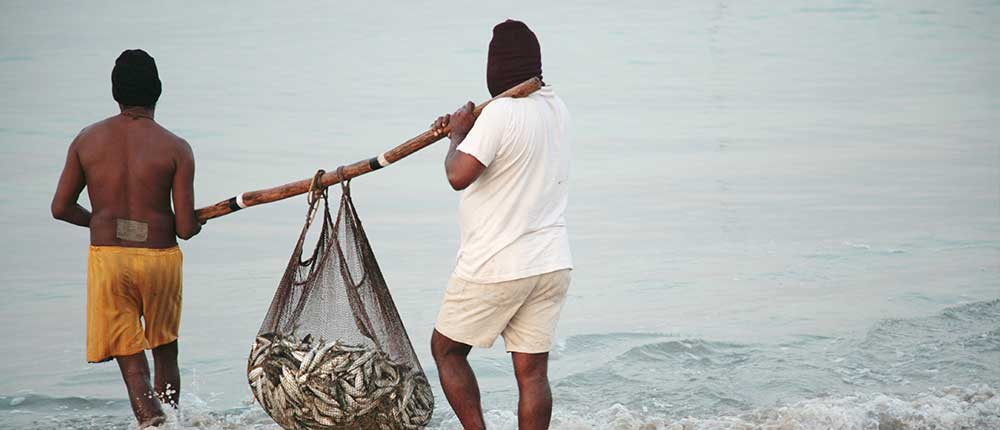
Overcoming Fishing Ban Season
Though the government has exempted fisheries from the lockdown restrictions, fishers cannot go during the fishing ban season (effective from April 15). Gohel says, 'This is going to severely affect the fishing community and the related businesses. Already 21 days of lockdown, and now the prohibition period for 45 days. It is going to be the toughest phase for us.'
The fishers had asked the government to treat this lockdown as their ban period. However, that would further defy the purpose of the fishing ban season, which allows the fish to breed peacefully. The small-scale fishers are now in a fix. Even after the ban period, they will find it extremely difficult to commence their activities. Chatterjee says, 'Fishing needs money. Due to this prolonged lockdown coupled with the ban period, they (fishers) wouldn't have money to start fishing. It is not only true for the marine fishers, but also riverine, inland fishers, and fish farmers. It has also severely affected small-scale fish vendors. These vendors have a hand-to-mouth existence. They used to buy and sell fish in their locality every day to meet their daily livelihood needs.'
Even after the lockdown ends, the fisheries will take much longer to recover. Till that time, the fisher groups are pushing for adequate compensations to the workers to help them keep the home fires burning.
(Sharada Balasubramanian is the recipient of the Asian Environmental Journalism Award 2019 for Environmental Journalist of the Year, Environmental Story of the Year, and the Prem Bhatia Award for Excellence in Environmental Reporting 2019, amongst several other prominent environmental journalism awards.)
